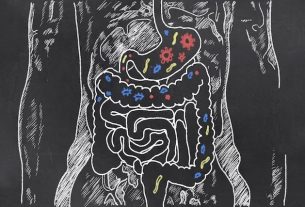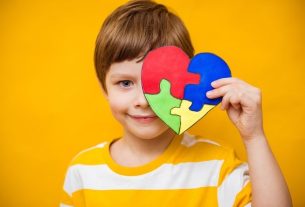The signs and symptoms of autism, also known as autism spectrum disorder (ASD), are very varied and are not always easy to understand.
The symptoms are mainly related to difficulty communicating and socializing, however they are also accompanied by unusual behaviors and interests, such as excessive interest in certain subjects or objects, difficulty adapting to changes in routine or abnormal body movements.
Although some of these changes can begin to be found in babies, the diagnosis is often only made a few years later. Furthermore, when the severity of symptoms is milder, they may only be identified in adolescence or adulthood. Understand better what autism is, causes and forms of treatment.

8 main symptoms of autism
The most common signs and symptoms of autism are:
1. Little eye contact
People with autism spectrum disorder tend to maintain less eye contact when interacting with other people.
2. Difficulty expressing ideas and feelings
In autism there may be difficulty using and understanding body language, gestures and facial expressions. Therefore, it is very common for these people to have difficulty sharing their interests and showing feelings or affection, which can be wrongly interpreted as indifference.
3. Annoyance with changes in routine
It is very common for children with autism to throw tantrums, cry a lot or become more aggressive when changes occur in their routine or the environment in which they live. These changes can be small and are not always clear to caregivers, and may include changing the packaging of their favorite food or taking different routes to those they are used to when leaving home.
4. Repetitive behaviors
These behaviors may include hand flapping, finger cracking, rocking the body back and forth when sitting, and tiptoeing. These behaviors can be seen as “manias”, they are more common in moments of happiness and can also include the repetition of words or phrases that they have heard.
5. Greater interest in objects than people
Children with autism generally prefer to play alone and are less interested in being with other children, and may even become irritated or aggressive when participating in group activities. Additionally, there may be unusual and excessive interest in certain objects, toys or parts of them.
6. Greater sensitivity to sounds, lights, smells or contact
Busy or noisy environments, fireworks, flashing lights, smells, touch or the use of certain clothes, for example, can arouse interest or cause exaggerated reactions, such as crying or irritability.
7. Not responding to your own name when called
Children with autism spectrum disorder tend to look less when called by name.
8. Difficulties in communication
Difficulties in communication can range from delayed speech development to difficulty starting or participating in conversations, as well as adapting to different environments. Therefore, people with autism often feel uncomfortable interacting with other people or act in ways that are considered inappropriate.
Online symptom test
If you have doubts about the possibility of autism, you can take our test to find out your risk and what to do:
What to do in case of suspicion
In children, in the presence of signs of autism, especially when there is a delay in speech development, difficulties in learning, socializing or developing autonomy, it is important to consult a pediatrician or neuropediatrician.
However, when the symptoms and difficulties of autism are not identified in childhood, they are not always easily noticed in adolescence or beyond. Therefore, in case of suspicion in adolescents, it is recommended to consult a pediatric neurologist and, in adults, a neurologist.
Read too: Autism in adults: what it is, symptoms, diagnosis and treatment
Symptoms of Autism in Babies
Babies around 6 months of age may have few facial expressions, low eye contact and not smile when interacting with other people. At 9 months, the baby may not respond to caregivers’ communications, may not look when called, may not babble sounds like “mama” or “dada” and may not look where the adult points. Furthermore, at 12 months the use of gestures or their imitation, such as saying goodbye, clapping or kissing, may be absent and the baby may not have started the first few words. Learn about other signs and symptoms of autism in babies.
Symptoms of Autism in Children
In cases of mild autism, symptoms can often go unnoticed because they are less visible. In cases with moderate and severe severity, the symptoms are more intense and children generally have greater difficulty learning, interacting with other children and developing autonomy. Check out details on how to identify mild autism.
Symptoms of autism in children may include:
1. Difficulty in social interaction
- Do not look into the eyes or avoid looking into the eyes;
- Do not smile when someone smiles at the child, or smile little;
- Do not allow yourself to be hugged or kissed;
- Having difficulty making friends;
- Having difficulty interacting with other children, preferring to be alone.
2. Difficulty communicating
- Not talking as much as other children;
- Repeat phrases and words several times;
- Not understanding gestures and facial expressions of other people;
- Not understanding jokes, popular sayings or sarcasm;
- Failure to respond or delay in responding when called;
- Maintain a monotone, robot-like tone of voice.
3. Behavioral changes
- Not being afraid of dangerous situations, such as crossing the street without looking at cars, or getting close to dangerous animals, such as large dogs;
- Become very agitated and upset with small changes in routine;
- Being very interested in something very specific, such as a cart wheel or an airplane wing;
- Make repetitive movements, such as flapping your hands, shaking your fingers or rocking your body back and forth;
- Become very agitated when in public or noisy environments.
Furthermore, signs of autism may be different in girls, who may be quieter and have greater difficulty adapting to social situations. In any case, if you suspect these symptoms, it is recommended to consult a pediatrician or neuropediatrician.
Symptoms of Autism in Teenagers and Adults
Sometimes, signs and symptoms go unnoticed in childhood and are only identified in adolescents or adulthood, when school and work responsibilities and the need for independence are greater.
The main symptoms and signs of autism in teenagers and adults are:
- Having difficulty making friends, preferring to be alone;
- Avoid eye contact;
- Becoming more anxious during social interactions;
- Be more rude, sincere and disinterested with others without meaning to;
- Present symptoms of depression and anxiety;
- Like to plan things with great care and attention;
- Not being able to understand what people feel;
- Better perceive small details, such as smells, sounds or patterns;
- Getting very agitated with changing routines and habits;
- Having difficulty understanding jokes, popular sayings or sarcasm;
- Being uncomfortable if someone comes too close or touches;
- Having an excessive interest in unusual subjects, such as astronomy and meteorology, and very specific activities, such as following several television newspapers and studying all the details of just one subject, for example.
Diagnosing autism in this age group is often difficult, either because the symptoms can be very mild or because the person ends up developing ways of dealing with their own difficulties, such as avoiding situations that make them feel uncomfortable, for example, what masks the symptoms.
How the treatment is carried out
There is no specific treatment for autism and interventions depend on the severity of the symptoms. The targeted measures generally help to improve the person’s communication, concentration and quality of life and treatment involves a team of health professionals, including doctors, physiotherapists, speech therapists and psychologists according to each person’s needs. Medications are often indicated to help alleviate some symptoms. Check out all the treatment options for autism.

Sign up for our newsletter and stay up to date with exclusive news
that can transform your routine!
Warning: Undefined array key "title" in /home/storelat/public_html/wp-content/plugins/link-whisper-premium/templates/frontend/related-posts.php on line 12
Warning: Undefined array key "title_tag" in /home/storelat/public_html/wp-content/plugins/link-whisper-premium/templates/frontend/related-posts.php on line 13



